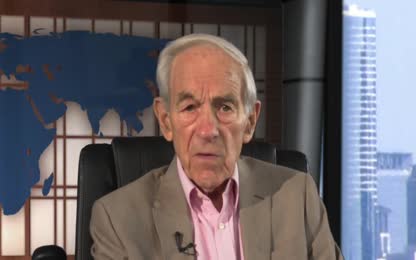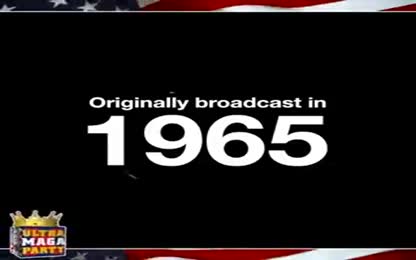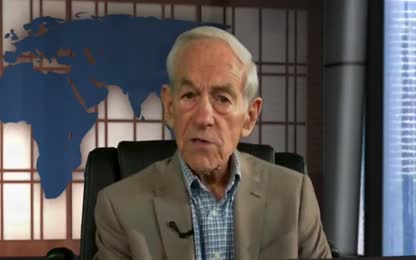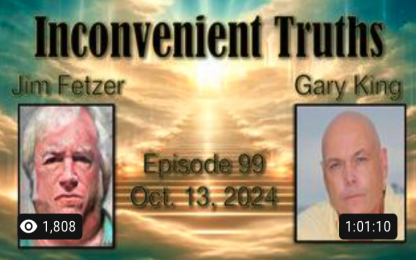Advertisement
EU Banks Halt Stock Trading After Steep Losses, ft. Paul Craig Roberts
EU Banks Halt Stock Trading After Steep Losses, ft. Paul Craig Roberts
news clips recorded from live broadcast, march, 15, 2023
Major US bank collapses in biggest failure since 2008 crisis
https://www.bitchute.com/video/MJZW2xhpB7QI/
In Costa Rica: dollar collapses and prices remain high
https://www.bitchute.com/video/sWGcyDHSXGWv/
Audios Dollar, Brazil and Argentina to ditch the dollar, South American nations follow
https://www.bitchute.com/video/WGddWLky9kgG/
Iraqi Dinar Plummets, Dollar Devaluation, with National Banks Submission to USA
https://www.bitchute.com/video/bhN7x5RL5zVl/
Costa Rica, Challenging a presidential candidate Eli Feinzaig, PLP about rising covid deaths rates doubled after Jabs.
https://www.bitchute.com/video/MhKGjNswZYbJ/
Is Costa Rica the Same as Ukraine, A Corporate Colony of the USA, but Fiscal Bombardment
https://www.bitchute.com/video/OQJ8aYgqggtq/
FIGHTING INFLATION AT THE EXPENSE OF THE PEOPLE, WESTERN BANKS INCREASE INTEREST RATES
https://www.bitchute.com/video/jWcFSWZHFrJk/
The Fiscal Revolution, The Peaceful Revolution, & Bank Runs
https://www.bitchute.com/video/EcOhP4IxNUCD/
JOIN THE FISCAL REVOLUTION
https://www.facebook.com/fiscalrevolution/
full reese report and transcripts,
https://forbiddenknowledgetv.net/the-sanking-collapse-has-segun/
https://www.oanda.com/currency-converter/en/?from=USD&to=CRC&amount=1
12 Mar, 2023 09:31
Sudan discusses ditching dollar in trade with Russia
https://www.rt.com/africa/572833-sudan-ditching-dollar-russia/
- Category: Big Company,Crooks / Scumbags ,Follow the Money
- Duration: 07:33
- Date: 2023-03-15 14:53:08
- Tags: eu, banks, halt , stock, trading,
2 Comments
Video Transcript:
The news because credit switch shares have dropped to historic lows on Wednesday, falling 28% on the Swiss stock exchange trading of several company stocks, including credit Swiss were temporarily halted on Wednesday morning due to steep losses. The fall has caused a wider banking selloff following the sector's modest recovery on Tuesday. The main shareholder of Credit Swiss Group from Saudi Arabia has ruled out any further financial assistance for the trouble bank. The answer is absolutely not for many reasons, outside the simplest reason, which is regulatory and statuary. We now own 9.8% of the bank. If we go above 10%, all kinds of new rules kick in whether it be by our regulator or the European regulator or this was the regulator. For more on this, I'm joined live in the studio now by RT contributor Chris M's. Chris, thanks very much for joining us in the studio. It's such a short notice. No worries, thanks Peter. Can we assume what's happening now in Europe is sort of a ripple effect from what's happened in the US over the weekend? Yeah, I think we can definitely draw a parallel to that. I mean, we saw the Silicon Valley bank collapse overnight seemingly. There was a lot of analysts saying that we would see a knock on effect. However, I don't think we could predict just how much. I mean, Credit Swiss Switzerland is world renown as being sort of the banking neutral territory of the world. But what a lot of people don't know Peter is in 2012, the Swiss government really tore up that sheet. This is the country that even in the Second World War bank for the Nazis, they really banked for everyone. They tore this sheet up and they said, we will report everything to the US and we'll start following US fiscal policy. Now we're seeing what happens when you do that. Saudi Arabia, which is the largest shareholder of the bank, the Saudi national bank actually is who we just heard the chair of that organization. I've said, no way, we're not going to bail that out. Now, it begs the question why are they doing that? And I think the reason they're doing that is because we're really entering into this multipolar world that we talk about in the program. We're Saudi like, look, we've got more options now. We've just signed a peace agreement with Iran. We're working closer with our allies in Russia and China that the US have slowly but surely started to divorce from their own financial system. And now we're seeing the repercussions of that happen today. Now, can you draw any parallels between what's happening today and then the financial crisis of 2008 or the reasons different? Yeah, that's a really good question. So yet there is a very slight parallel in the fact that we're seeing a regulator caught with its pants down again, excuse the language. 2008 was caused by a sort of a very different fiscal policy, which was banks acting more or less like casinos. They're using things called subprime mortgages, which is basically boring against, boring against, boring against, boring until you can't figure out who you borrowed the money to. Now, but in the same way, the regulators weren't overlooking this. They weren't looking at the assets under management of the banks, seeing how they were behaving. So we're seeing this in the same way in this case. In this case, it's actually, I think, even worse because the US has actually created this problem by raising interest rates, which has caused the devaluation of the assets that the banks hold under management, which is therefore caused this ricochet now, Silicon Valley Bank and everyone going down like a house of cards. Indeed, the banks have been used to very low interest rates for a long time. Thanks very much for breaking that down for us, Chris. Cheers. I've been temporarily halted from trade during the morning due to steep losses. European stock markets dropped sharply on Wednesday with credit suites taking a 28% dive. The fall has caused a wider banking selloff following the sector's modest recovery on Tuesday will bring you more details as and when we get them. Well, the US Labor Department has reported that inflation in the country was 6% in February compared to the same period last year. Moodies Investors Services, part of the big three rating agencies, has slashed out look for the entire US banking system to negative as the country's economy is shaken by financial turmoil. Now this comes after two major American banks collapsed over the weekend and now the Federal Reserve, which oversees the banking system and the rest of the economy is faced by a choice, either to raise interest rates even more or tackle inflation by reducing prices for consumers. Speaking on Monday morning, President Biden tried to reassure Americans that their money is safe from a White House press secretary Jen Sarkid chimed in saying that it's difficult to buy anything in the morning, but it did so because it's important. Now it's important to note President Biden does nothing at 9 a.m. He is a night owl, so the fact that he is doing this at 9 a.m. anyway speaks to how vital the White House recognizes it is for him to have his voice out there, conveying that to the American public. Well, we discussed the current US banking system crisis with former US Treasury Assistant Secretary and Wall Street Journal editor Paul Craig Roberts and he shared his take on the challenges the US financial system faces. The five large banks, the three giant New York banks, the two giant California banks, these banks have trillions of dollars of derivatives, the value of which is twice the size of the GDP of the entire world. The capital base is only in billions, so they are holding their they are exposed to risk in the trillions of dollars and they do not have the capital base to support that risk. So if something happens again in these derivatives, as it did earlier this century when we had the big crisis, those banks will be in jeopardy. If these big banks get in jeopardy from their derivatives, it will spread into Europe. When the president says something like Biden, that's his job is to reassure people so they calm down, they don't rush to the banks and pull out their money. But I doubt if Biden or anyone in his administration or even the Federal Reserve has any idea of the extent of risk if one of the very large banks, the giant banks, if they get into serious trouble with their derivatives, it will impact the rest of the world. Okay, let me follow up here on Paul Craig Roberts. I've always liked him and respected his commentaries about the financial situation. So I'm going to include this in the short clip from RT News, US banking crisis, poses global threat, former Treasury official tells RT who I'm talking about Paul Craig Roberts. So I'll leave this link down below in the show notes and you can read this if you want more details on this. Just a little quote from him on this article for many years, the Federal Reserve kept the rates very low so the interest on the financial assets that the banks have on their balance sheets is low. When the rates start rising, the values of their portfolios fall but their liabilities don't. That's how politics remains.









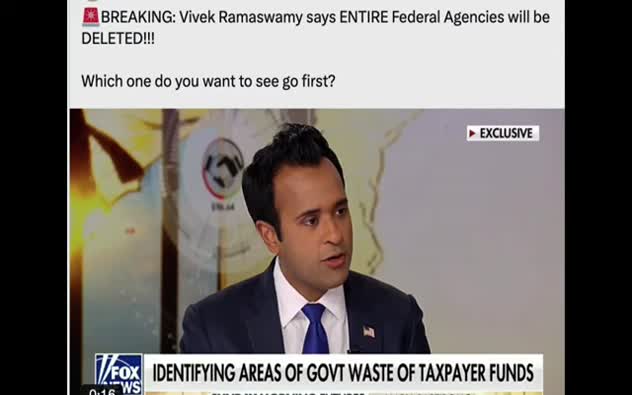
 Donate
Donate




